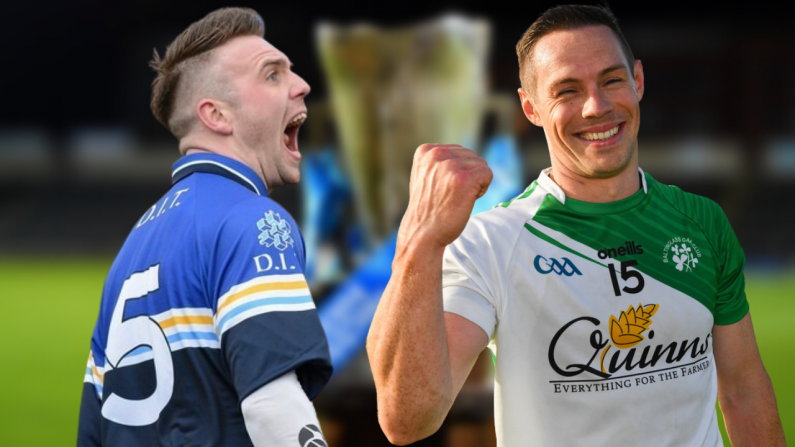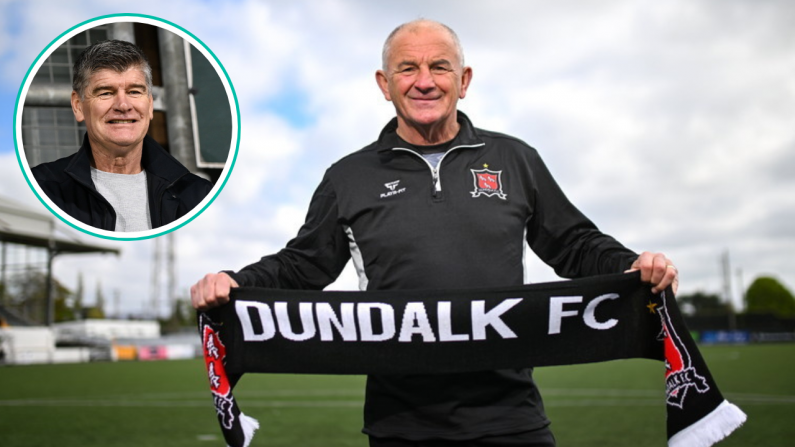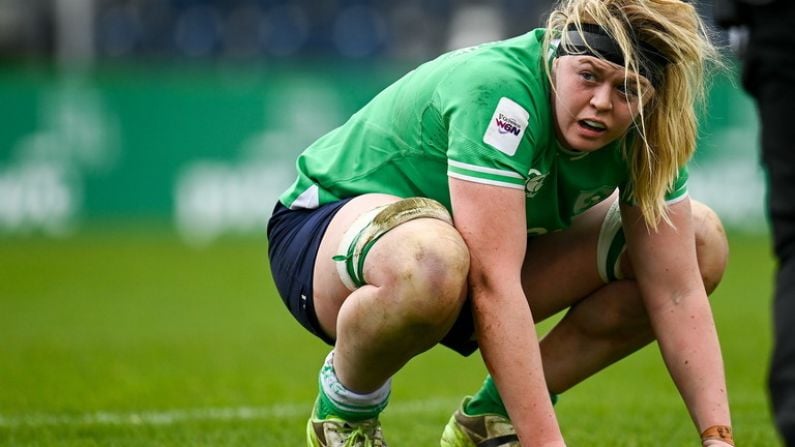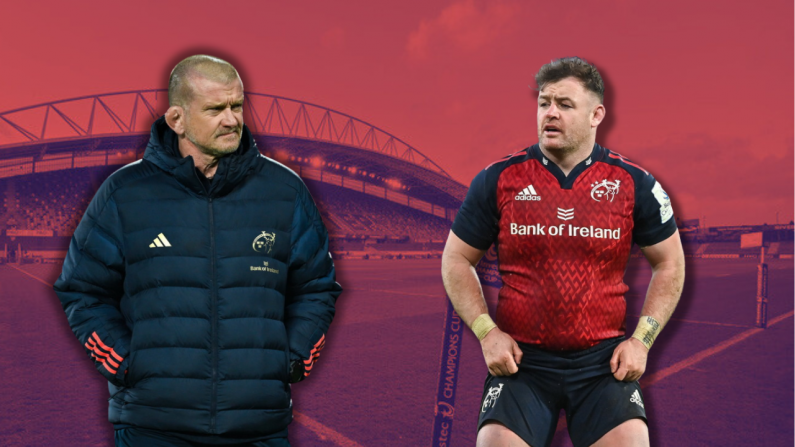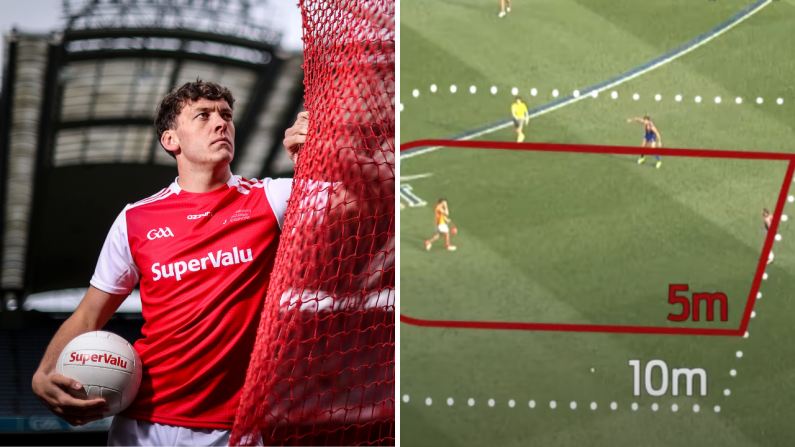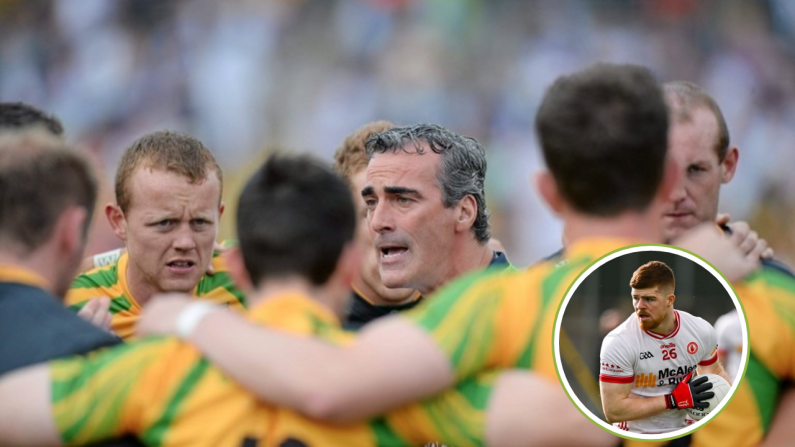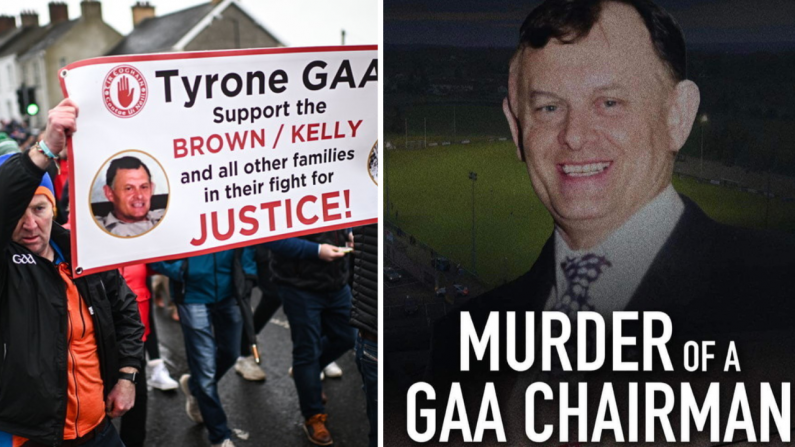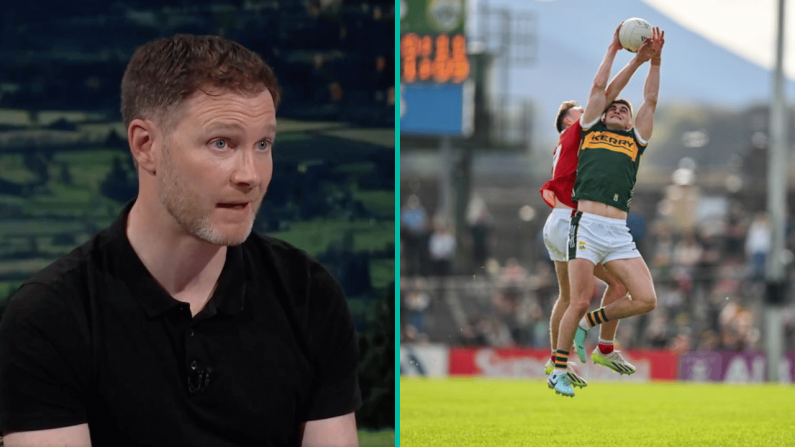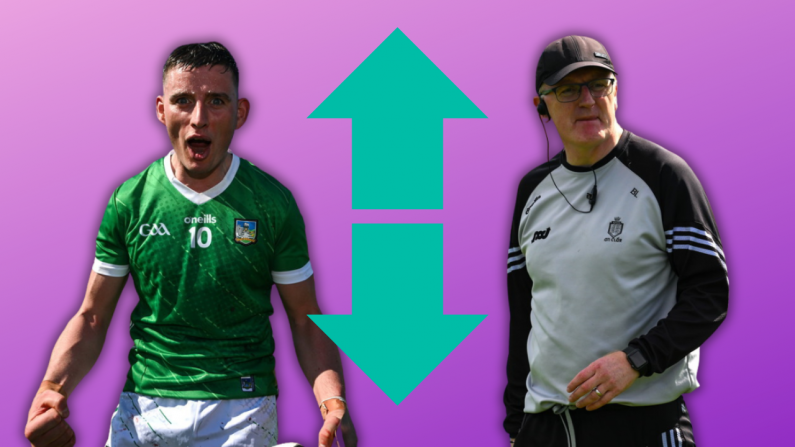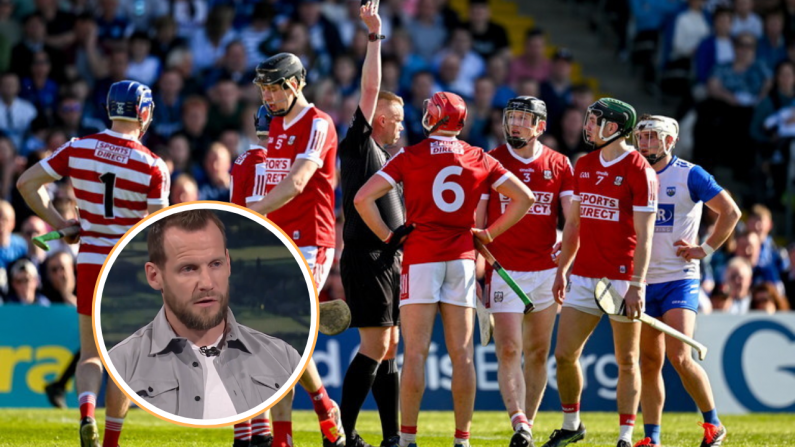In 2013, a Dublin Institute of Technology team made history in the Electric Ireland Sigerson Cup by becoming the first side from the college to win third level Gaelic football's top prize.
For John McGrath, being part of that DIT victory was particularly remarkable as just two years previous, the Wicklow and Baltinglass forward had been diagnosed with Leukemia.
21 months after the win, Meath and Blackhall Gaels man Alan Nestor became the second member of the DIT Sigerson panel to battle cancer.
During the week, they spoke about their ordeals, making their comebacks, how visits from major GAA figures helped, and Aidan O'Shea's memorable semi-final speech.
John McGrath is running a fundraiser for the Bone Marrow for Leukaemia Trust. You can support him through his iDonate.ie page.
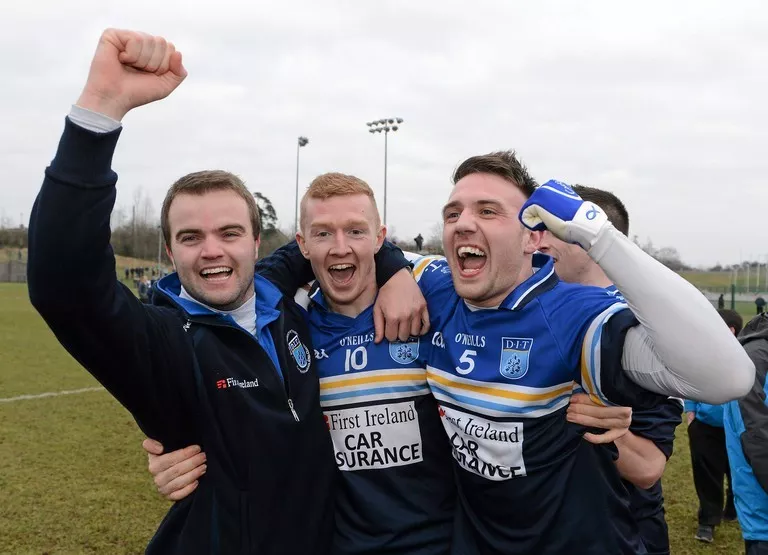
23 February 2013; Selector Billy O'Loughlin, left, Ciaran Reddin and Alan Nestor, right, Dublin Institute of Technology, celebrate after the final whistle. Sigerson Cup Final, Dublin Institute of Technology v University College Cork, Athlone Institute of Technology, Athlone, Co. Westmeath. Picture credit: Matt Browne / SPORTSFILE
'I was like a Michelin man going around the place'
PJ Browne: John, you were diagnosed with Leukemia in early 2011 when you were only 24. Could you paint a picture of where you were at that point in your life?
John McGrath: I should probably avoid painting that picture! I'd probably started to kind of knuckle down. The previous year, myself, Alan and a few lads would've had a good bit of craic in college.
I started to really kind of knuckle down, give a little bit more towards Wicklow as well, because I had taken - I won't say a break from Wicklow - but I was not fully invested when I was in the first year of college.
The winter of 2010, and 2011. It was a big year for me with Wicklow. I put in a lot of effort. At the start of the National League, I was playing well and enjoying it. Especially the first two games against Carlow and Leitrim.
It was after the Leitrim game, I was on the way home on the bus. I was up in the front of the bus by myself on the verge of crying with a toothache.
I went to the dentist that next day and he said, 'There's was nothing wrong with you, your mouth is fine'. Then we were playing Sigerson against UL on that Thursday. I remember landing at the game and making it known that I wasn't feeling great to management.
We lost, and on the way home, I just felt so bad that I went to the doctor again. He told me to come in for blood tests on the Monday, but don't do anything between now and then. He was talking about glandular fever.
I decided to ignore him and play against London on the Sunday. 10 minutes into that, I noticed, 'This isn't right'. I had to put my hand up and basically be pulled after 10 minutes.
That was the very start of where I couldn't do what I wanted to do in general day-to-day life. I'd been feeling that for the week. We played against Leitrim and you're playing well, and you're kicking five points in the game. You just think you have a toothache.
Two days [after the London game], you're in St James's Hospital, and about to start your first cycle of chemo.

18 January 2009; John McGrath, Wicklow, in action against Ronan Carroll, left and Padraig Rath, Louth. O'Byrne Cup Semi-Final, Louth v Wicklow, Drogheda, Co. Louth. Photo by Sportsfile
PB: What were the side effects of chemotherapy?
JM: Once the first week is over, there's different things that kick in. There's certain drugs that do different things and one that I'll never forget is a drug called methotrexate. That removes the lining of your mouth and your stomach. It was horrendous because you couldn't eat anything, it was like razor blades through your throat. I was on yoghurts for the week or two after that. After two weeks, you start to think more about your hair and those side effects.
Alan Nestor: I was just about to say, give the people what they want, they want to know about the hair!
JM: I was thinking about it from day one, but it took ages for it to actually fall out. The whole way through my illness, my head was bald but when I wore a hat, I didn't look too bad because I had my eyebrows. But when I was finished my treatment and was back healthy, that's when my eyebrows were gone, and that's when everybody thought, 'Jeez, you look really sick'. That was really strange.
AN: You were on the road to recovery, and you were looking worse!
JM: Pretty much, yeah!
Keep track of my progress over the month by following The #Gr8ful28
Please share your pictures of your walk, run, or any form of activity you do over the month, and tag The #Gr8ful28Link to donate to the Bone Marrow for Leukaemia Trust below. https://t.co/6Ts4RHi3aa
— John McGrath (@john_mc_grath) January 27, 2023
AN: The chemo, for whatever reason, it annihilated me. It was very, very severe. They were telling this to my brothers behind-the-scenes. To my face, they were telling me I'm doing great and there's not a bother on me.
As a result, I got steroids just to have a normal function. That had a big impact on me in the long run. I ballooned. You went really gaunt and skinny, lost loads of weight, I remember the pictures.
I was like a little Michelin man going around the place, no eyebrows, no hair literally anywhere! I was freezing. You don't understand the function that hair has. I used to go to bed with a hat and a little snood. I felt really, really sick but I wanted to eat all the time. The steroids had me starving but I wasn't.
Physically, my hair didn't grow back the same. On the beard here, I've got alopecia. I get that randomly every now and then in different places. My hair is a different colour, different texture.

17 February 2011; Alan Nestor, DIT, in action against Mark Cahalane, UL. Sigerson Cup First Round, DIT v UL, St Anne's Park, Raheny, Dublin. Picture credit: Brian Lawless / SPORTSFILE
'People just made contact. Paul Galvin dropped in'
PB: Would the DIT Sigerson team have known what John was going through?
AN: I think I might have even started because you were unavailable. I think we were kind of in and around pushing each other for places around that time. Similar the next year, when we won it. I was like, 'Grand, that's one less man!' You're looking out for yourself. You're like, 'Right, John has a toothache, that's ideal'. I might get in now.
Behind-the-scenes with DIT - and I can only imagine was it was like for your family and the club - but everyone was just like, 'Woah'. You're not equipped. We were a bit older at that stage, me and you, but 19-year-olds are trying to deal with this, and they are just not equipped. Nobody knows anything about it, and they're afraid to ask.
PB: John, are you getting support from the GAA community while you're going through all this?
JM: It was absolutely incredible. It came from everywhere. I started pinning up cards on one of the walls of the room I was in, in James'. By the time I was leaving, it was taking up the whole wall nearly.
People just made contact. Paul Galvin dropped in. He was around DIT, so one of our guys brought him in. Sean Cavanagh sent down a message. Peter Canavan came into me. He was my favourite player of all-time. Somebody made contact with him, made it known to him, and these people just took time out of their lives to come down. Those type of things make it all the easier to get up the next day.
PB: Alan, was it a similar experience for you?
AN: It was unbelievable. To be fair, I wasn't a county player at the time. I'd played league in 2011. This is 2014. I wasn't a big name. The support was phenomenal and still is. My club, Blackhall Gaels, ran a big fundraiser for cancer awareness. My friends did Movember, and some still do that every year.
Dermot Earley rang me, he'd had it at some stage. Those phone calls mean so much when you're going through it. There's a lad here, he was originally playing with a club in Meath, and is now playing with Castlerahan - Oisin Kiernan. I didn't know about it for ages when he had it. I was planning on ringing him, but then I was like, 'He's not going to even know who I am!' I didn't even ring him because I wasn't exactly like Dermot Earley or Peter Canavan.
Even now, you get great comfort talking to people who've been through something. You're on the same page as them, and have an understanding of all that heavy stuff - there's a kinship there.

10 February 2013; Ciaran Lenihan, Meath, in action against John McGrath, Wicklow. Allianz Football League, Division 3, Wicklow v Meath, County Grounds, Aughrim, Co. Wicklow. Picture credit: Barry Cregg / SPORTSFILE
JM: If I got sick now, the first thing I'd be looking for now is googling 'GAA and cancer'. When you type that in, you find the likes of Alan Nestor and John McGrath popping up. I tend to get a lot of random messages on Facebook from fellas who are sick. They don't care whether you're Dermot Earley or Peter Canavan. They just want to know when you go back on the pitch, whether it was club, county, college - anything.
'I would have played that Sigerson year with it'
PB: Alan, you were diagnosed with testicular cancer in August 2014, but you'd suspected for a while that something was wrong.
AN: I was totally slack. This is a cautionary tale. I went travelling in 2013 when I didn't make the Meath team after the Sigerson, and I was devastated. In a panic, I booked a trip across Asia, didn't end up doing loads of it. When I came back, I noticed a little lump on my testicle. I was like, 'I wonder what that is?'
I went to a clinic, let's just say, and the nurse said that it wasn't much to be worried about. It was tiny, like the top of a pen. She did say to me that if it got bigger I should go to a doctor straight away. I never went. But, I never once had pain. I just related a problem to pain.
I would have played that Sigerson year with it. Theoretically, I would have had cancer all that time. That summer, we were giving a big push with the club. I was going well, and trying not to think about it. I was giving all I could to get on the Meath team again. I was trying to be really focused, giving up all the socialising. This lump on my testicle wasn't going to get in my way - that's the way I saw it. All the time, it was getting bigger and bigger.
It got to bigger than half the size of my actual testicle by the time I went. I was on holidays, and I was not happy on holidays. I was just so worried about it. On the flight home, I got severe pain - I don't know if it was actual pain, or your mind trying to tell you to do something about this.
I got an appointment on a Tuesday. I remember the Galway races were on, and I was supposed to go, and I didn't go because they rang me straight back and said I needed to get an ultrasound.
The nurse was going all the way up underneath my arms and my neck, and I was like, 'What is she doing?' She was just silent the whole time, and I started to cop on that maybe it had spread. That was the case. It had spread all across my body. There were tumours in my lungs, arms, neck - some of them were actually quite big.

23 February 2013; Dublin Institute of Technology Sigerson Cup captain Colin Walshe lifts the Sigerson Cup as his team-mates celebrate. Sigerson Cup Final, Dublin Institute of Technology v University College Cork, Athlone Institute of Technology, Athlone, Co. Westmeath. Picture credit: Matt Browne / SPORTSFILE
The thing about testicular cancer is that it's in the high 90s for survival rate. I heard Des Bishop do a comedy routine one time and he said it's like 'fake cancer' - you get all the attention but you're going to be grand.
Lance Armstrong was still cycling, and his were the size of grapefruits. That always made me feel, 'Well, I wasn't as slack as him!' He had golfball size tumours in his brain, and that's where I was headed for.
When I went in on the Thursday, they said to me that 'This is 99 per cent, we're just waiting on a biopsy, but we're going to take it out anyway'. They just took out the testicle straight away.
There was this lad, and I was full sure he was going to put in a prosthetic testicle. He was stone mad to do it, this surgeon. I was like, 'No, don't put one in, lad!' I didn't want one in, thinking about having the craic with the boys after. I was full sure that I was going to wake up with this prosthetic testicle in there.
I hadn't even been officially diagnosed, and my testicle was gone. It was a weird thing. Nobody knew about it. I only told my parents on the day I was going in for surgery. I was in work the day before. That C word just floors everyone. I was conscious of knowing what it was before telling everyone.
Chemo started for me a week later. Normally, they'd give you time to recover from the surgery because you can get an infection in the wound but they had to start straight away for me because they were worried about the spread. It was quite aggressive.
On the Friday, I was literally pulling my hair out.
JM: You'd just grab a chunk and pull it out.
AN: No feeling! It's like, 'This should hurt!'
JM: Al, did you have any other scares after you recovered?
AN: Yeah, I did. I got a job with Kerry Group. I was due to start, but couldn't because I had to go through my chemo. They deferred the role. I was based in Kerry, and when I was down there, they switched my scans so I wouldn't have to come all the way back to Dublin for bloods and scans. Do you still have to do those checkups?
JM: The checkups, zero. Once five years hit, they didn't want to see me again.
AN: That's brilliant. With testicular cancer, there's quite a high chance you might get something else after. I'm still going back once a year. At the start, I was going back every three months.
There was a big lump on my back. It turned out it had always been there. They went back through my other scans and found it. I was honestly sick to my stomach. I called in sick, I couldn't go to work.
JM: That's a fair reason to call in sick.
AN: They weren't going to challenge me on that one!

27 August 2006; Alan Nestor, Meath, in action against Stephen Ormsby, Roscommon. ESB All-Ireland Minor Football Championship Semi-Final, Roscommon v Meath, Croke Park, Dublin. Picture credit; Brian Lawless / SPORTSFILE
PB: John, when did you start thinking about getting back on the football pitch?
'The national anthem hit home that day'
JM: It was February 22nd when I was diagnosed, and my last day of chemo was May 24th.
Once I got out, I was just walking everywhere and anywhere. As a month or six weeks passed, I thought, 'Sure, maybe I'll start going back to the gym' and then by the August Bank Holiday weekend, I was coming on as a sub for my club in a challenge game and felt like a lamb just jumping around on the pitch, running everywhere.
AN: What were your [chemotherapy] cycles? We were getting word through, 'He's in isolation, no one can go near him'.
JM: Carol (his girlfriend at the time and now his wife) and my family were allowed come in but only two at a time. You couldn't have the whole family in and sit around. There were four cycles. I was told at the start, that it would be about nearly five months of treatment between the four cycles, but ended up two days over three months. They give room for recovery, and infections, different scenarios. I just lived rigidly. They asked me to do something, I did it.
AN: I had four blocks as well. They were 21 days - five days of chemo and then 16 days of recovery. I was just getting back right, and then you'd be back in. It was some devastation on those Sundays. It was like going back to school as a young fella. It accumulates and by the fourth block, I was really, really sick. I had to be dragged in kicking and screaming on the Monday morning, I was like 'I'm not going!'
PB: John, when did you start to feel like you were physically back to the level you'd been at before the diagnosis?
JM: Still chasing it! We played that club championship that August and September. I still have a bit of ill feeling that I didn't start because our manager held me in reserve. I'd say to save himself from abuse, people going, 'You can't be playing him'. We lost the semi-final by a point. Every championship bugs me that we've lost.
I put in a lot of work that winter. The GPA rowed in behind me, and put me through an incredible programme down in Blackrock, and Barry Solan down in Medfit.
I played Sigerson the following year, not great but was there. By the league, I was working my way into it, and got my way into the Wicklow starting team by the third last league game against London.
PB: That must have been nice, getting back into the starting team against London, when a year earlier you were going off against London and then getting diagnosed.
JM: Very emotional for me. I remember standing there on the pitch in Ruislip, and the national anthem was playing. That was the thought I had, 'London was a year ago, where this all started'. The national anthem doesn't hit me normally but it hit home that day.
We went on, beat Clare in the last game for promotion, and then beat Fermanagh in a National League final in Croke Park. You're standing on the steps lifting the cup within 12 months [of getting the all-clear].
I think I felt good then, and was back to it, but I wasn't really. You're playing inter-county football but it took and extra year or two to get back to where I wanted to be.

27 June 2015; John McGrath, Wicklow, celebrates after scoring his side's first goal as Armagh's Andy Mallon and Brendan Donaghy, right, react. GAA Football All-Ireland Senior Championship, Round 1B, Armagh v Wicklow. Athletic Grounds, Armagh. Picture credit: Piaras Ó Mídheach / SPORTSFILE
AN: It takes that blind positivity to get through the sickness, and then you're thinking 'I'm back exactly where I was'.
JM: You're always convincing yourself, and telling the manager, 'No, I'm fine, don't be feeling sorry for me!' The last thing you want is a manager leaving you off because of your past illnesses.
'Some lad absolutely clocked me!'
PB: Alan, when did you get back to playing?
AN: In our club, one of our players passed away in his sleep with SADS, the same thing as Cormac McAnallen. Because of that, the club were even more behind me, and more determined to make it a positive thing when I came back.
I just finished my last round of chemo, and was severely ill. I was brought on as a sub in a league final. The game was in the balance. It was absolute lunacy! I could barely walk, and I was a tonne weight. I had no eyebrows, just a big white sheet walking around the place.
That was so meaningful for me, and it was so impactful for me, for the team, for the other team. There was a big report in the Chronicle. When I see stuff like that, I always take great joy in the recovery. There's so little positivity around the C word because it has brought so much pain for so many people but it's good to promote the really positive things when people get over it.
This is the best #CancerBants yet!!!!....#225 💛💙 pic.twitter.com/VpDuG7f5wL
— Alan Nestor (@nesspuss) December 7, 2014
JM: Who were ye playing in that league final?
AN: Ballinlough. There was a massive row at half-time in the dugout. I was staying away because I was in no shape. I kind of came in late, and some lad absolutely clocked me! This lad had no remorse, me just out of chemo and I got cleaned.
I'm very conscious that I didn't have that much of an inter-county career. I don't want it to sound like I'm making excuses for myself but I never felt like I got anywhere near my physical capacity again. So much changed for me after.
My endurance capacity, did your lungs ever get back? Mine were never the same. When I got Covid, I was really, really sick. I was really worried when I had it. That was early on in Covid, and I was really struggling with breathing. I had real trouble with breathing for about a year after the chemo - I was always out of breath.
Before my chemo, the be all and end all for me was Meath, but I had to come to terms with it fairly quickly [that the dream was over]. I knew, even at club level, that I wasn't able to do the things that I used to be able to do.
John, chemo can't really take away your sweet right foot. For me, especially with the way inter-county football went, and the conditioning that was required, there was no way I was ever going to get there.

13 February 2013; Darran O'Sullivan, DIT, in action against Tommy Moolick, right, and James Calliff, NUIM. Sigerson Cup, Quarter-Final, DIT v NUIM, Bray Emmet's 3G pitch, Bray, Co. Wicklow. Picture credit: David Maher / SPORTSFILE
You and I were quite similar, Jack The Lad, enjoyed the social stuff. We hadn't really copped on at stage of our lives as to what was required to be an inter-county footballer. I wanted to be one, but there was just too much messing. We were really alike. That was why it hit me hard when you were sick.
I was delighted that in 2019, I made the Meath hurling squad. It was such a nice thing. I only made it for four months. I tore my hamstring three times in a row trying to get back. It was a disaster. I got dropped eventually, they couldn't keep carrying me.
It was such a small thing. I played a bit of Kehoe Cup. To wear the Meath jersey, I have hairs standing on the back of my neck now thinking about that. It was such a small thing but because I'd built it up when I was sick that 'I'm going to wear the Meath jersey'. I played Kehoe Cup in Newbridge, and it was such a big thing to me.
* * *
'I like to mention the Sigerson now and then'
The 2013 DIT team which won the Sigerson Cup was a star-studded one featuring All-Ireland winners and household names. They had Meath's Bryan Menton and Monaghan's Colin Walshe in the backline, Mayo's Aidan O'Shea in midfield, and a forward line featuring four-time Kerry All-Ireland winner Darran O'Sullivan, Cork's Mark Collins, and Jason Doherty of Mayo. Fringe Dublin panel members Kevin O'Brien and Ciaran Reddin, both of whom would win All-Irelands with the capital, were also part of the team.
They defeated DCU 1-11 to 0-9 in the semi-final, and then UCC 3-8 to 0-7 in the final. The celebrations which followed were made infamously memorable by Alan Nestor posing naked in the dressing room with the just Sigerson Cup to save his blushes.

23 February 2013; Ciaran Reddin, left, and Alan Nestor, Dublin Institute of Technology, celebrate after the final whistle. Irish Daily Mail Sigerson Cup Final, Dublin Institute of Technology v University College Cork, Athlone Institute of Technology, Athlone, Co. Westmeath. Picture credit: Matt Browne / SPORTSFILE
PB: That DIT Sigerson Cup win in 2013, where does that rank in your GAA careers?
AN: For me, it's definitely number one. John's won a few club championships. so maybe it's different for him. I was absolutely gunning for trying to cop on and grow up, and get on the Meath panel. It was a big thing, and still is a big thing in my house and club to have won a Sigerson. My brother (Nigel) has won an All-Ireland with Meath, so it's nice for me to have something. The two brothers have two county championships as well. I just like to mention the Sigerson now and then, but it's hard to compete with a club championship and an All-Ireland. It's definitely the biggest thing I've done in my GAA career.
It was a very special team. Apart from the talent, there was great craic. Even throughout the league that year, it was the time of my life. Billy and the management team brought loads of that energy and craic, an 'us against the world' attitude, even though we were a ridiculous team on paper.
JM: The unity that was there that year was great. Me and Bob Lambert always laugh about it. He was in goals that year.
He's from Wicklow, and we still laugh about it now because we remember coming home from playing Maynooth in the league, and Bob was like 'Jesus, this team, we're definitely going to win the Sigerson'.
I was playing it down a little bit because 'DIT, and the geography of it, and we're all spread over the city, we don't have the unity that's needed to compete, and there's a reason DIT have never won a Sigerson. Sure look at our team two years ago that lost to UL. The ability in that, it was scandalous that we didn't win the Sigerson, let alone get out of the first round'.
Then a few months later, there's Bob in goals getting a Sigerson All-Star, not conceding a goal in the whole championship. He's like, 'Johnny, you were so pessimistic about it!' It did go the right way with the camaraderie that year, it was far greater than any other year. It was brilliant. There were some great leaders in there who were also good craic.
Al's drive was incredible. He was one of the few that wasn't playing inter-county football at the time. Between him and Ross Sheridan, the two of them were standing out amongst men that were giants.
There times that I was like, 'I didn't contribute in the way I would have liked to contribute'. Just before Sigerson started, I played three O'Byrne Cup games in six days. I pretty much ruined my chances of playing any way regularly. It's tough enough for a Wicklow lad to get in the team when you have Darran O'Sullivan, Tomas O'Connor, Mark Collins, all these. I have a lot of love, and at the same time a little bit of frustration for it.
The craic we had after that was definitely up there as well. Alan, definitely was at the centre of the craic for the few days after.
AN: It was all good craic until Joe Duffy was ringing. The Liveline lines were hopping in anger, all the auld ones were disgusted.
I was thinking about it recently when we were at some pitch in Dublin where we used to train. If you went through where we trained across the four years I was there, it's absolutely hilarious. Most lads who play club football in Dublin wouldn't have played in the places where we trained. It was everywhere, all over the county. Even Bray one time.
What happens oftentimes is that some lads would make excuses not to go. It's not on your door step, and you're not all living in the same place. It takes a lot of effort to get across the city if you don't have a car. You had exams, and some lads had labs. I think because of the experience of losing to UL, there was just a determination for lads to always be training, and get the most out of it.
We dominated the league that year. There was a real intensity to training that winter. The sheer numbers at training. The likes of me and Ross were given a chance because we performed in the league.
It was a real boost to all the panel members who were going out to Parnells, Ringsend, Thomas Davis, Bray, or wherever we were going. It gives you a boost to say you were all in it together. That's the way it felt.
I was just laughing there because John was a brilliant teammate, great craic on the bus, and he was brilliant for slagging. Then he could just turn on the other mask, and he was a total driven lunatic on the pitch. He just willed his way through everything. He was unbelievably thick if he wasn't starting.
Maybe you wouldn't have got as many minutes, John, but to me, especially with all the games you played in other years, you were a massive part of the whole thing. It's something to be really proud of, what we had there. On a cultural level alone, it was massive.
I'll never forget Aidan O'Shea's speech in the hotel before the DCU game. It was unbelievable. There was no stopping us when we walked out that door.
PB: What was so good about that Aidan O'Shea speech?
AN: It was just the way he spoke. I'd never seen him like that before.

13 February 2013; Aidan O'Shea, DIT, in action against Tommy Moolick, NUIM. Irish Daily Mail Sigerson Cup, Quarter-Final, DIT v NUIM, Bray Emmet's 3G pitch, Bray, Co. Wicklow. Picture credit: David Maher / SPORTSFILE
JM: It was a big learning curve. That was 2013, so I'd had six years with Wicklow. You think you're playing inter-county football but because I'm aware of abilities and what other counties do, I would never have been like 'Oh sure I play inter-county football, isn't that great'.
I always looked to who was the best, who could I learn from, and how could I better myself. I'd look to soak up as much information as I could. I was just obsessed with learning from certain people, and Aidan was always top of the pile.
I remember that Sigerson weekend in Athlone. The hotel we were staying in had two rooms with PlayStations and Xboxes. There were gangs of lads in them. I just remember Aidan lying in the bed, and he was wearing his skins, sipping on water, getting whatever supplements he wanted in.
He was probably cursing me because he probably just wanted to lay down in his own bed by himself. I was looking to see what a pro does when they're recovering, and getting ready for a final. We had so many players like that but he was the main one. When he spoke, it just comes natural to him. You just tried to absorb whatever he had, and take it forward.
AN: What compounded that speech, and the feeling in the room that day, is that even if other lads spoke, we'd probably have the same feeling because we were on a path at that stage. Sometimes, when you're on a team, you just know it's going the right way.
Aidan spoke so well, and his performance - I remember looking at it during Covid, there's a highlight reel on YouTube - it's absolutely ridiculous, his performance against DCU. It's one of the best performances I've ever seen in the flesh. It was totally ridiculous.
* * *
'I was 24, but I wasn't really an adult at all'
A decade on from winning that Sigerson Cup, both John McGrath and Alan Nestor are still involved in the GAA. Nestor plays with Blackhall Gaels.
McGrath retired from inter-county football in 2018, aged 31, after a 12-year career with Wicklow. Since then, he's played in the last three Wicklow finals with Baltinglass, winning the title in 2020.
The lives of both have been shaped by their battles with cancer.
AN: I was really positive about the experience, and it was a good thing for me, mentally, to go through something like that. It was very humbling. It really brought me back to what's important, and all that soft stuff. I was an old enough lad by the time it hit me. I was 24, but I wasn't really an adult at all. I wasn't adulting in any shape. It just brought me back down to earth. It was a very good thing for me in that sense.
JM: It was very humbling. If somebody was to give me the option of not going through it, I would never have taken it. Getting sick is probably the greatest thing that's happened to me as a person because of what I've learned from it, the empathy that you'd have towards people. You'd always have that view of there being somebody worse off rather than just 'Why me?'
The thing that stands out to me is acceptance. That's a big thing for me. Acceptance and moving on, or acceptance and being comfortable in your body or mind. Even though you would have loved to get back and play with Meath or play at whatever level you were aiming for, you said by April or May, you knew it wasn't going to happen. Accepting that, and being able to do something in your life that you were still a very happy person about, is really important.
PB: Would that DIT team still be close? Do you keep in touch?
AN: I wouldn't have talked to John there in a long while. That's what happens in life.
For me, you, Rob Lambert, Ross Sheridan, Eoin Murray, there's a tranche of us there who wouldn't have got the same exposure that Aidan has got for playing in how many All-Irelands, Mark Collins has won an All-Ireland [U21 title], Darran has All-Irelands, and lifted Sam Maguire.
It might not mean as much to those boys because they've gone and done it, but for us, there's a massive thing. We have the cancer thing as well. There's definitely a kinship there, and an understanding. I'm grateful to have that experience. There's nothing like winning. We'd be close without being in each other's pockets.

